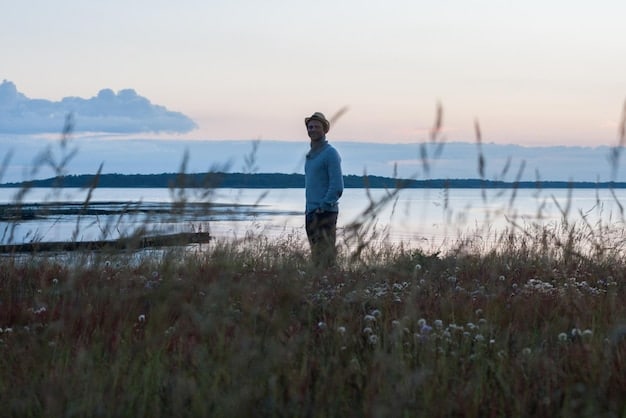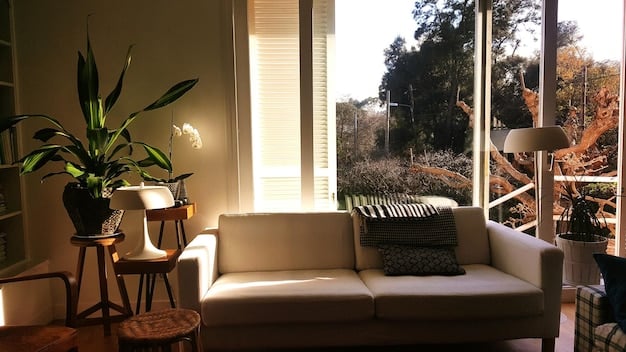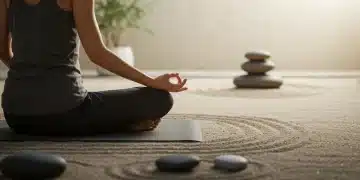The Zen of Simplicity: Finding Fulfillment with Less

The Zen of Simplicity encourages adopting a minimalist lifestyle to achieve greater fulfillment by reducing material possessions and focusing on gratitude, mindfulness, and meaningful, experiences fostering mental clarity and deeper connections.
In today’s fast-paced, consumer-driven world, many find themselves yearning for something more, something deeper than the accumulation of material possessions. The Zen of Simplicity: How to Live a More Fulfilling Life with Less Material Possessions offers a pathway to that “something more,” guiding you towards a life rich in experiences, gratitude, and inner peace.
Understanding the Zen of Simplicity
The Zen of Simplicity isn’t about deprivation; it’s about intentionality. It’s about consciously choosing to focus on what truly matters, decluttering not just your physical space, but also your mental and emotional landscape.
The Core Principles
At its heart, the Zen of Simplicity is rooted in the ancient philosophy of Zen Buddhism, which emphasizes mindfulness, meditation, and living in the present moment. These principles translate into a lifestyle that values experiences over things, quality over quantity, and intentionality over impulsiveness.
Benefits of Embracing Simplicity
Adopting a simpler lifestyle can lead to numerous benefits, from reduced stress and anxiety to increased financial freedom and a greater sense of purpose. It allows you to free up time and energy for pursuits that truly resonate with your values.
- Reduced Stress: Less clutter equals less stress. A minimalist environment promotes calmness and focus.
- Increased Financial Freedom: Spending less on unnecessary items allows you to save, invest, and pursue your passions.
- More Time and Energy: By simplifying your life, you gain more time and energy to dedicate to meaningful activities.
- Greater Sense of Purpose: Focusing on experiences and relationships leads to a deeper sense of purpose and fulfillment.
Ultimately, the Zen of Simplicity offers a blueprint for living a more intentional, meaningful, and fulfilling life, one that is less cluttered, less hurried, and more connected to the present moment.

Decluttering Your Physical Space
Decluttering is often the first step in embracing the Zen of Simplicity. It involves consciously letting go of possessions that no longer serve a purpose or bring joy to your life.
The KonMari Method
The KonMari Method, popularized by Marie Kondo, emphasizes decluttering by category rather than by location. The key is to ask yourself if each item “sparks joy.” If it doesn’t, it’s time to let it go, thanking it for its service before discarding it.
Practical Decluttering Tips
Start small, focusing on one area at a time, such as a drawer, a shelf, or a closet. Be honest with yourself about what you truly need and use, and don’t be afraid to donate, sell, or recycle items you no longer want or need.
- Start Small: Begin with a small, manageable area to avoid feeling overwhelmed.
- Be Honest: Ask yourself if each item truly brings you joy or serves a purpose.
- Donate or Sell: Give unwanted items a new life by donating or selling them.
- Recycle Responsibly: Dispose of items in an environmentally friendly way.
Decluttering your physical space is not just about removing items; it’s about creating a more intentional and mindful environment that supports your well-being and reflects your values.
Mindful Consumption and Intentional Spending
Living a life of simplicity also requires a shift in how we consume and spend. Mindful consumption involves being aware of our spending habits and making conscious choices that align with our values.
Questioning Your Purchases
Before making a purchase, ask yourself if you truly need the item, if it aligns with your values, and if it will add value to your life. Avoid impulse buys and instead, take time to consider your options.
The Value of Experiences
Instead of spending money on material possessions, consider investing in experiences that create lasting memories and enrich your life. Travel, concerts, workshops, and quality time with loved ones are all examples of experiences that can bring greater fulfillment.
Mindful consumption and intentional spending are about making conscious choices that support your values and contribute to a more fulfilling and meaningful life. By questioning your purchases and investing in experiences, you can cultivate a greater sense of gratitude and contentment.

Cultivating Gratitude and Appreciation
Gratitude is a powerful practice that can transform your perspective and enhance your overall well-being. It involves consciously acknowledging and appreciating the good things in your life, both big and small.
The Daily Gratitude Practice
Start a daily gratitude practice by taking a few minutes each day to reflect on what you’re grateful for. You can write in a gratitude journal, share your gratitude with others, or simply take a moment to appreciate the beauty around you.
Finding Joy in Simple Things
Learn to find joy in the simple things in life, such as a warm cup of tea, a beautiful sunset, or a kind gesture from a friend. These small moments of joy can add up to a greater sense of happiness and contentment.
- Gratitude Journal: Write down things you’re grateful for each day.
- Share with Others: Express your gratitude to the people in your life.
- Mindful Moments: Appreciate the simple joys in your daily routine.
Cultivating gratitude and appreciation is about shifting your focus from what you lack to what you have. By practicing gratitude daily, you can cultivate a more positive outlook and a greater sense of contentment with your life.
Mindfulness and Living in the Present Moment
Mindfulness is the practice of paying attention to the present moment without judgment. It involves being fully engaged in what you’re doing, thinking, and feeling, without getting caught up in thoughts about the past or worries about the future.
Meditation and Mindfulness Exercises
Meditation is a powerful tool for cultivating mindfulness. Even a few minutes of daily meditation can help you to become more aware of your thoughts and emotions, and to develop a greater sense of inner peace. Other mindfulness exercises include mindful breathing, mindful walking, and mindful eating.
Reducing Distractions and Being Present
In today’s world, we are constantly bombarded with distractions. To cultivate mindfulness, it’s important to reduce distractions and create space for being present in the moment. This might involve turning off notifications, limiting screen time, and creating a quiet space for meditation or reflection.
Mindfulness and living in the present moment are about cultivating awareness and appreciation for the here and now. By practicing mindfulness daily and reducing distractions, you can cultivate a greater sense of inner peace, clarity, and contentment.
Building Meaningful Relationships
Ultimately, the Zen of Simplicity is about connecting with what truly matters, and that includes our relationships with others. Building and nurturing meaningful relationships is essential for a fulfilling life.
Quality Over Quantity
Focus on cultivating deep, meaningful relationships with a few close friends and family members, rather than trying to maintain a large number of superficial connections. Quality relationships provide support, connection, and a sense of belonging.
Being Present and Engaged
When you’re spending time with loved ones, be fully present and engaged. Put away your phone, listen attentively, and show genuine interest in what they have to say. Meaningful connections are built on genuine presence and connection.
- Prioritize Quality: Focus on a few deep connections.
- Be Present: Give your full attention to loved ones.
- Practice Empathy: Understand and share their feelings.
Building meaningful relationships is about prioritizing connection, presence, and empathy. By investing in quality relationships and being fully engaged with loved ones, you can cultivate a deeper sense of belonging, support, and fulfillment.
| Key Concept | Brief Description |
|---|---|
| 🏠 Decluttering | Removing unnecessary items to create a more peaceful environment. |
| 💰 Mindful Spending | Being conscious of purchases and prioritizing experiences over things. |
| 🧘♀️ Gratitude | Appreciating the simple joys and blessings in daily life. |
| 🤝 Relationships | Nurturing meaningful connections with loved ones. |
Frequently Asked Questions
▼
The Zen of Simplicity refers to a lifestyle focused on minimizing possessions and maximizing experiences, gratitude, and mindfulness. It aims to reduce stress and increase contentment
▼
Begin by decluttering one small area at a time, such as a drawer or shelf. Use the KonMari method by asking if each item sparks joy. Donate, sell, or recycle items you no longer need.
▼
Mindful spending helps you prioritize needs over wants, reducing impulse buys and saving money for meaningful experiences. It fosters greater financial freedom and reduces stress.
▼
Practicing gratitude shifts your focus from what you lack to what you have, increasing contentment and reducing the desire for more possessions. It enhances overall well-being.
▼
Meaningful relationships provide support, connection, and a sense of belonging, which are crucial for a fulfilling life. They emphasize quality over quantity, fostering deeper connections.
Conclusion
Embracing the Zen of Simplicity is a journey towards a more intentional, meaningful, and fulfilling life. By decluttering, practicing mindful consumption, cultivating gratitude, and nurturing meaningful relationships, you can create a life that is rich in experiences, joy, and inner peace, demonstrating how to live a more fulfilling life with less material possessions.





